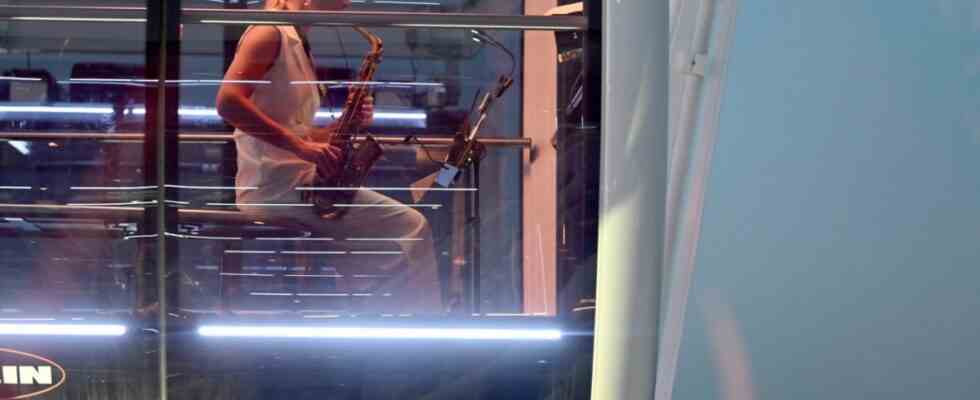The number of musicians who can claim to have played their instrument eighty meters above the ground in a Ferris wheel gondola is probably 27. That’s how many gondolas the “Umadum” Ferris wheel has in Munich’s Werksviertel, in and around around on Friday evening the world’s first Ferris wheel opera of the same name will be premiered and repeated on two days – as long as there is no storm or thunderstorm.
Expanding this project into the Ferris wheels of Vienna, London or Dubai is worth considering, says “Umadum” managing director Michael Meier at the run test on Thursday. This year he is making his attraction available to Martina Taubenberger, initiator of the Riesenradoper and director of the “Out Of The Box” festival.
Since 2019, Taubenberger has been exploring the unconventional locations of the constantly evolving Werksviertel with the “Out Of The Box” festival. This year, the three festival in-house productions are subject to the main themes of movement and contact as well as their counterparts of standstill and isolation – no abstract concepts for post-pandemic artists. The Austrian Christian Muthspiel, whom Taubenberger commissioned to compose the Ferris wheel opera, was even inspired by an image from the first lockdown: the singing people of Italy, isolated on their balconies and at the same time connected in the music.
The acoustics in the booths are like in a bad studio. Nevertheless it has to work.
(Photo: Stephan Rumpf)
The young professional musicians of the “Orjazztra Vienna” face Taubenberger’s crazy idea and allow themselves to be deprived of “all parameters of making music” through the isolation in the gondolas, says Muthspiel. Spread over 27 gondolas, 27 musicians go through three rounds of the Ferris wheel for a total of 44 minutes of work, each of which is precisely composed and noted in the notes. Instead of beat and direction, seconds and synchronously started stopwatches guide in every cabin. Muthspiel – here the name says it all – counts in the start of the stopwatch on the mixing desk via radio.
The audience can choose between two forms of reception: ride along with the musicians and listen to their individual parts, or experience the conference switch via speakers and screen in a deck chair at the foot of the Ferris wheel. It is even possible to switch between the gondola and deck chair during the performance. You pay as much as you can and like when you go out.
The public can ride in the cabins. Or it can stay on the ground and watch the conference call.
(Photo: Stephan Rumpf)
Muthspiel mediates between score and mixer. “I haven’t memorized the score, but I’m still more listening than seeing,” says the director of the “Orjazztra”. Even if Muthspiel is aware that his production is currently on the designated building site of the new concert hall, he created the Riesenradoper as an isolated work: “It was important to me to compose a work that only works at this location and not even on a conventional stage.”
Singer Lucia Karning considers this plan to be a success. Only in isolation in the gondolas did she fully understand the dry runs from the rehearsal room. Karning is one of the three singers who revolve with their voices as instruments in the gondolas and who stick to a libretto that the musicologist and literary scholar Taubenberger compiled from various texts from English-language literature.
With the first verse from TS Eliot’s “The Waste Land”, Lucia from gondola number one opens the opera: “April is the cruellest month”, she sings shortly after the start of the stopwatch, highly concentrated into the microphone, relative to the 360-degree Umadum view unimpressed. Equipped with headphones, walkie-talkie, tuning fork and – to be on the safe side – two stopwatches, she does her part, which means a lot of self-organization and waiting for her. Just like sitting down in lockdown.
Composer Christian Muthspiel mediates between the score and the mixer.
(Photo: Stephan Rumpf)
Generating concert energy in such an isolated way in your own gondola is not easy, disruptive factors such as technical problems or passengers are lurking everywhere, and there is also bad acoustics: “Like in a studio, but in a bad one,” Muthspiel jokes. But technically everything runs smoothly, delays only occur, if at all, in the image transmission, which “Orjazztra” achieves, musically and logistically, great things. The meticulous and varied composition is driving, says Lucia. From the bilingual babble of speaking voices to the distorted roar of the brass instruments to the musical children’s song: “It’s really good for me,” says the jazz singer in sympathetic Viennese dialect. Nevertheless, she would have liked to have heard the entire work from the floor just once. In this project, this privilege is reserved for the public.

